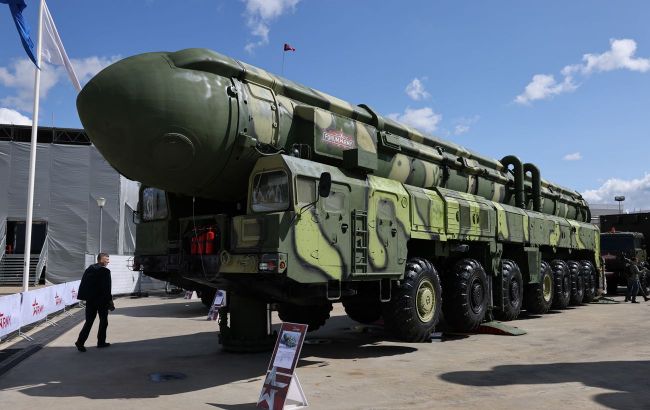Biden approves unprecedented new nuclear strategy for US - NYT
 Photo: The United States has approved a new nuclear strategic plan (Getty Images)
Photo: The United States has approved a new nuclear strategic plan (Getty Images)
In March, US President Joe Biden approved a classified nuclear strategic plan that concentrates on expanding the focus on China's nuclear capabilities, according to The New York Times.
The new strategy, called "Nuclear Employment Guidance," addresses the potential for conflicts involving the US with Russia, North Korea, and China.
The publication notes that this is the first time a strategy has been approved that identifies multiple states as potential threats. The document is highly classified, with only a few paper copies available to a select group of Pentagon officials.
The White House has not officially announced the approval of the strategy. However, two senior administration officials disclosed the changes. Vipin Narang, an M.I.T. nuclear strategist who served in the Pentagon, pointed out that "the president recently issued updated nuclear weapons employment guidance to account for multiple nuclear-armed adversaries."
"In the past, the likelihood that American adversaries could coordinate nuclear threats to outmaneuver the American nuclear arsenal seemed remote. But the emerging partnership between Russia and China, and the conventional arms North Korea and Iran are providing to Russia for the war in Ukraine have fundamentally changed Washington’s thinking," The New York Times writes.
Russia, China, and North Korea: three threats
The New York Times notes that Russia and China are already conducting joint military exercises. Intelligence agencies are trying to determine whether Russia is assisting North Korean and Chinese missile programs in response.
Biden, along with leaders from Germany and the United Kingdom, secured public statements from China and India that the use of nuclear weapons in Ukraine would be unacceptable, and the crisis has at least temporarily abated.
"It was an important moment. We are dealing with a Russia that is radicalized; the idea that nukes wouldn’t be used in a conventional conflict is no longer a safe assumption," said Richard N. Haass, a former senior State Department and National Security Council official.
The new strategy prioritizes China, reflecting the rapid expansion of the country’s nuclear forces under President Xi Jinping. Xi has abandoned the previous strategy of minimum deterrent in favor of aiming to match or even exceed the arsenals of Washington and Moscow. The publication notes that in recent years, China has actively expanded its nuclear capabilities, constructing new missile silos that were first detected in commercial satellite images.
The changes in US nuclear strategy have also been driven by the growing nuclear threat from North Korea. Under Kim Jong Un, Pyongyang has doubled its nuclear arsenal to over 60 weapons. The expansion of this arsenal makes North Korea an increasingly serious challenge for the United States, given the potential for coordination of threats with Moscow and Beijing.
An unstable nuclear environment
The new strategy also considers the possibility of coordinated actions between Russia, China, and North Korea, prompted by deepening military cooperation between Moscow and Beijing. Russia and China are already conducting joint military exercises, and US intelligence is trying to determine whether Moscow is aiding North Korean and Iranian missile programs in exchange for weapons supplies for the war in Ukraine.
The document also notes that the new US president, who will take office in January 2025, will face a radically changed and extremely unstable nuclear environment compared to the situation three years ago. The NYT reminds us that Russian dictator Vladimir Putin has repeatedly threatened the use of nuclear weapons against Ukraine, and the new US nuclear strategy takes all these threats into account.
Furthermore, The New York Times notes that China has halted dialogue with the United States on nuclear security, which was previously considered a crucial step in preventing the risk of accidental nuclear escalation. It is noted that the last negotiations between the states were held in late autumn 2023, shortly before the meeting between Biden and Xi in California, where they attempted to restore relations between the countries. The Chinese side had already hinted at that time that it was not interested in further negotiations due to American arms supplies to Taiwan.
Thus, the publication states, that Biden's strategy is aimed at deterring Russia, China, and North Korea simultaneously. This is described as an unprecedented challenge for US nuclear policy.
Global nuclear threats
In recent years, the global situation regarding the likelihood of nuclear weapon use has worsened.
Iran plans to declare itself a nuclear state by the end of 2025.
South Korea may begin developing its nuclear weapons in response to threats from North Korea.
Meanwhile, China is expanding its nuclear arsenal but has promised not to use it first.

